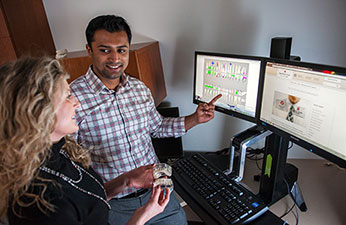April 3, 2014
MARSHFIELD, Wis. – A newly-formed institute within Marshfield Clinic Research Foundation (MCRF) will tackle some of the biggest questions surrounding better integration of medical and dental care.
The Institute for Oral and Systemic Health (IOSH), unveiled today, is an outgrowth of an already nationally-leading dental informatics research program at MCRF. IOSH was developed in collaboration with the Clinic's Division of Education and Family Health Center of Marshfield, Inc. (FHC).
IOSH will use applied, preventive and basic science research, patient and provider education and informatics and information technology to better align medicine and dentistry in a growing effort to improve quality of patient care and lower overall health care costs.
"For too long, dentistry and medicine have operated in separate silos. We know connections exist between gum disease and chronic illnesses such as diabetes and kidney disease, but we're only scratching the surface," said Dr. Amit Acharya, IOSH director. "Through research and new informatics tools such as the Clinic's integrated medical-dental record and clinical decision support systems, we're going to bridge that gap."
IOSH's efforts will focus on enhancing patients' dental care and dental outcomes by improving their overall health, reducing costs and designing intuitive clinical tools that help health care providers holistically serve patients. IOSH also will provide support for the Division of Education's dental residency program and other educational and training opportunities.
Acharya, who joined MCRF in 2009, is a national leader in oral health informatics and a general dentist by training. During his MCRF tenure, he has played a key role in integrating the Clinic's electronic dental record within its existing electronic medical record and establishing one of only three dental informatics postdoctoral fellowship programs in the nation.
Along with Acharya, IOSH will consist of a team of scientists and research specialists. They'll work closely with other centers within MCRF, the Clinic's Division of Education and FHC, strengthening relationships and integration with experts in biomedical informatics, information technology, genetics, microbiology, population health and education.
"Marshfield Clinic and FHC for more than a decade have improved access to dental care in Wisconsin," said Dr. Brian Ewert, Clinic executive director. "Good oral health is essential to a person's overall well-being and the Clinic has supported initiatives to bridge the gap between medicine and dentistry to fulfill the Clinic's mission. Better integration of research and education is the next step."
IOSH has an advisory council that includes nationally-recognized experts and internal leaders to advise Acharya on key strategies for IOSH growth and operations and to identify and secure key funding opportunities.
"Bringing these resources together, we're doing so much more for patients and striving to provide improved holistic care. That's what motivates and drives me and helps me keep working to make an impact in our communities and beyond through our research. I don't want to pursue research for the sake of research; I want IOSH to apply research to improve peoples' lives."
Marshfield Clinic and FHC together offer one of the few places in the U.S. where patients can get medical and dental care from the same health system. Because of this model, IOSH can effectively apply its research and educational efforts into medical and dental practices throughout the Marshfield Clinic system, establishing national models tried and tested in a large health care environment.
That translates to continually improving health and dental care delivered at a lower cost for patients. For instance, IOSH will work with FHC to extend its ability to reach patients by researching and implementing ways to be more efficient and address health literacy issues hindering people from seeking the care they need.
"As we seek to achieve unprecedented rates of preventive dental care for our patients, we need to develop technology and tools that now don't exist," said FHC Director Greg Nycz. "IOSH is critical to FHC dental centers' long-term success as it works to educate and reach Wisconsin's population that carries a disproportionate burden of oral disease."
Initial funding for IOSH comes from existing resources within MCRF, FHC and the Division of Education. IOSH will sustain itself through grant funding.
#####
Marshfield Clinic Research Foundation (MCRF), a division of Marshfield Clinic, was founded in 1959. It's the largest private medical research institute in Wisconsin. MCRF consists of research centers in clinical research, agricultural health and safety, epidemiology, human genetics, and biomedical informatics. Marshfield Clinic investigators publish extensively in peer-reviewed medical and scientific journals addressing a wide range of diseases and other health issues, including cancer, heart disease, diabetes, eye disease, neurological disease, pediatrics, radiology, women's health, agricultural safety and genetics.
The Marshfield Clinic system provides patient care, research and education with more than 50 locations in northern, central and western Wisconsin, making it one of the largest comprehensive medical systems in the United States.

